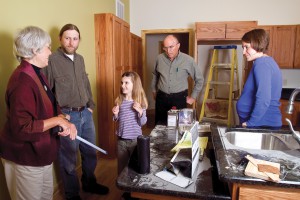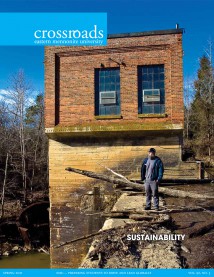
Sarah Myers (left) and Herb Myers '66 (center) are building onto the home of son-in-law Jason '99 and Janelle '01 Myers-Benner and granddaughter kali. Sarah, who formerly directed a non-profit, and Herb, a psychiatrist, are moving as retirees from Pennsylvania to Virginia.
Upon their graduation from EMU, Jason ’99 and Janelle ’01 Myers-Benner knew that living sustainably would be an overarching priority in their lives. In the decade-plus since, this desire has grown into “a vast and consuming project … engaging and energizing, even while exhausting,” Jason writes.
The Myers-Benners minimize their travel by vehicle, heat their house entirely with its passive solar design and backup wood stove, and try to grow, raise or gather as much of their food as possible from their land in Keezletown, Virginia.
Intertwined and inseparable elements of their approach to sustainability are the Myers-Benner’s significant emphasis on community and connection. They live out these values, in part, by homeschooling their 7-year-old daughter, Kali, building relationships with their neighbors and investing in nurturing, caring interactions across multiple generations. (Janelle works 30 hours per week as academic program coordinator at EMU’s Center for Justice and Peacebuilding.)
As Janelle’s parents, Herb ’66 and Sarah (class of ’67) Myers, began planning for their retirement, the family saw an opportunity to further develop its commitment to multi-generational living. In 2010, Herb and Sarah began building a 900-square-foot addition to Janelle and Jason’s house. The two living quarters are separated by a shared laundry room, utility room bathroom, and office. Their addition includes a rainwater cistern, a solar water heater, and other features intended to maximize the structure’s energy efficiency.
The new arrangement – a modern twist on the traditional Amish dawdy haus for aging parents – will make it easy for the family to share appliances, vehicles, tools and other household items. Moreover, Sarah writes, moving in beside Janelle and Jason will allow them all to share in the work of trying to live sustainably: tending the garden, harvesting and preserving food, caring for livestock, gathering wood and more.
Herb and Sarah’s addition also anticipates the physical challenges of aging by building all the main rooms to accommodate wheelchair access. That feature will make life easier both for them and their family caregivers next door.
“This building project … [will not] render our lives perfectly ‘sustainable,’” Sarah writes. “But for us it seems to be an opportunity worth taking for the health of our planet and for our own sense of wholeness.”
